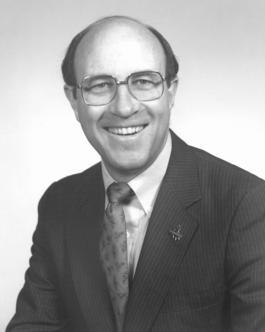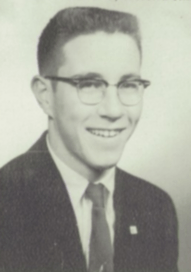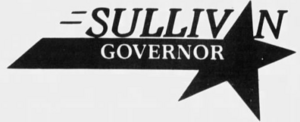Mike Sullivan (Wyoming politician) facts for kids
Quick facts for kids
Mike Sullivan
|
|
|---|---|
 |
|
| United States Ambassador to Ireland | |
| In office October 22, 1998 – June 20, 2001 |
|
| Appointed by | Bill Clinton |
| Preceded by | Jean Kennedy Smith |
| Succeeded by | Richard J. Egan |
| 29th Governor of Wyoming | |
| In office January 5, 1987 – January 2, 1995 |
|
| Preceded by | Edgar Herschler |
| Succeeded by | Jim Geringer |
| Personal details | |
| Born |
Michael John Sullivan
September 22, 1939 Omaha, Nebraska, U.S. |
| Political party | Democratic |
| Other political affiliations |
Republican (2022) |
| Spouse | Jane Metzler |
| Children | 3 |
| Relatives | Joseph Sullivan (grandfather) |
| Education | University of Wyoming (BS, JD) |
| Signature | |
Michael John Sullivan (born September 22, 1939), also known as Mike Sullivan, is an American lawyer and politician. He served as the 29th governor of Wyoming from 1987 to 1995. Later, he was the United States ambassador to Ireland from 1998 to 2001. He was a member of the Democratic Party for most of his career.
Sullivan was born in Omaha, Nebraska, but grew up in Douglas, Wyoming. His family was very involved in Wyoming politics. After graduating from the University of Wyoming, he worked as a lawyer. He began his political career by serving on a local hospital board in Natrona County, Wyoming.
As governor, Sullivan signed a law creating a state holiday for Martin Luther King Jr.. He also appointed several judges to the Wyoming Supreme Court. He was the first governor to endorse Bill Clinton for president in 1992. After his time as governor, President Clinton appointed him as the ambassador to Ireland.
Contents
Early Life and Education
Michael John Sullivan was born on September 22, 1939, in Omaha, Nebraska. His family had a long history in Wyoming politics. His father, Joseph Sullivan Jr., was an attorney and a member of the Democratic Party. His grandfather and uncle also served in the Wyoming Legislature. Sullivan grew up in Douglas, Wyoming.
He was a great student at Converse County High School. He served as class president and graduated near the top of his class in 1957. Sullivan then went to the University of Wyoming. He earned a degree in petroleum engineering in 1961 and a law degree in 1964.
In 1961, he married Jane Metzler, and they had three children. For almost 20 years, from 1968 to 1986, he practiced law at a firm in Casper, Wyoming.
Political Career
Starting in Local Politics
Sullivan's career in public service began at the local level. In 1976, he was appointed to the board of the Natrona County Memorial Hospital. He served on the board for ten years, including as its president. He stepped down in 1986 after he was elected governor.
Governor of Wyoming
In 1986, Mike Sullivan decided to run for governor of Wyoming. He won the Democratic nomination and then faced Republican Pete Simpson in the general election. Even though his opponent's campaign spent more money, Sullivan won the election. He won again in 1990 against Republican Mary Mead, this time by a very large margin.
During his time as governor, Sullivan focused on several key issues. He worked to improve Wyoming's economy by encouraging trade with other countries like Australia and Taiwan. He also played a big role in national politics. He was the first governor to support Bill Clinton in the 1992 presidential primaries.
One of his most important achievements was signing a law to create a state holiday honoring civil rights leader Martin Luther King Jr.. For years, Wyoming had struggled to pass this law. Sullivan felt it was important for the state to officially recognize King's contributions.
He also made important decisions about the state's justice system. He appointed three judges to the Wyoming Supreme Court. He also dealt with a difficult decision about a serious criminal case, which was the only one of its kind in Wyoming for many years.

U.S. Senate Campaign and Ambassadorship
After serving two terms as governor, Sullivan ran for the United States Senate in 1994. He wanted to fill the seat of retiring Senator Malcolm Wallop. He won the Democratic primary without any opposition. However, he lost the general election to Republican Craig L. Thomas.
In 1998, President Bill Clinton nominated Sullivan to be the U.S. Ambassador to Ireland. The United States Senate approved his nomination, and he served in this role from 1998 until 2001. As ambassador, he represented the United States and worked to maintain a strong relationship between the two countries.
Later Life
After his time as an ambassador, Mike Sullivan returned to Wyoming. He has remained active in public life and education. In 2002, he was named chairman of the board for the University of Wyoming's Institute for Environment and Natural Resources. The university also named him a distinguished alumnus in 2007.
Sullivan has continued to be involved in politics. He supported Dave Freudenthal for governor in 2002. In 2008, he supported Hillary Clinton during the Democratic presidential primaries. In 2022, he temporarily registered as a Republican to vote for Liz Cheney in her primary election.
Key Political Views
Throughout his career, Mike Sullivan held several important positions on issues affecting Wyoming.
- Economy: He believed in protecting Wyoming's energy industry. He supported an oil import tax to help keep oil prices stable. He also worked to increase trade and bring business to the state.
- Government: Sullivan supported creating single-member districts for the state legislature. This means each lawmaker is elected by a specific, smaller area. He believed this would make representation fairer.
- Social Issues: He was a strong supporter of creating a holiday for Martin Luther King Jr.. He also signed a law raising the legal drinking age to 21. He believed this was important for public safety.
- Taxes: Sullivan was careful about state spending. He sometimes proposed small tax increases on things like cigarettes to help pay for state programs. He also used his veto power to block parts of the state budget he disagreed with.



